- Home
- Guillermo Del Toro
The Hollow Ones Page 3
The Hollow Ones Read online
Page 3
She shoved open the door with her foot, gun forward. Not a closet but a walk-in pantry. On the floor before her lay an adult female, arms straight down by her sides. Her throat had been cut. The flesh on her palms was slashed with defensive wounds.
Odessa yelled “BODY!” alerting Leppo, but she did not expect him to return. Odessa followed her training to the letter. She went around the spreading pool of blood to check the woman’s pulse, finding her throat warm still, but no throb whatsoever, no sign of life. The act of pushing her thumb up under the woman’s chin caused the neck wound to open a bit. Air or gas gurgled out of the gap in a big, bright bubble of blood.
A warm wave of nausea surged from Odessa’s torso right up into her throat, and she staggered backward. The sick feeling lingered but she did not lose it. She felt weightless, numb. Odessa was certain she knew the woman’s face. It was Peters’s estranged wife.
The identification brought her back into herself. One thought occurred to her:
Three children.
Suddenly she was sharp again. She had to be. Her senses cleared—and at once she heard screaming. Coming from upstairs.
Odessa hurried out of the pantry. She made her way through the kitchen, finding the bottom of the stairs, looking up. “LEPPO!” She called Walt’s name again, wanting to know his location, and also needing him to know she was coming up the stairs. Friendly fire was something they had drilled on at the FBI Academy every week.
More screaming now. Odessa started running up the steps two at a time.
“LEPPO!”
She scanned the hallway; it was vacant. Blue light pulsed through a street-facing window: local police support arriving out on the street. The cop lights should have been reassuring, but instead the flashing blue gave the second-floor landing a disorienting fun-house effect.
She moved into the first doorway she saw. The room was peach and pink, all soft colors, ruffle on the comforter of the unmade bed.
Next to the bed, under a bloody sheet on the floor, lay a small human form.
Not real, it can’t be real.
Odessa flipped the sheet back from one end, just enough to view a small bare foot, ankle, and thin calf. She didn’t need to see the wounded body. She didn’t want to see the face.
Back out into the hallway. Hyperventilating, ears screaming, her vision rising and falling like a ship in a storm. “LEPPO!”
A second bedroom waited ahead. Inside the open door, a New York Rangers hockey poster hung on the wall, splattered with thick arterial spray. The faint scent of iron hung in the air…
The bed was empty, no body on the floor. Odessa’s eyes darted frantically about the small, dark room.
The closet. A sliding door, half open. Odessa shoved it fully open, fast—
A young boy’s body was inside, slumped like a rag doll against the rear wall, dead-eyed, staring.
Not real, it’s not real—
Odessa spun around, gun up. The room was empty behind her. It was all happening too fast.
A hard thumping against the wall from the adjoining room to her left caused a picture frame to fall off and shatter. Yelling, a struggle—another bump against the wall.
A fight?
“LEPPO!”
Odessa tore out into the flashing blue hallway. As soon as she turned toward the next door, two adult men came crashing out of the adjoining room.
Odessa went into a three-point stance. She made Leppo immediately in the crazed blue light. He was struggling with a male assailant. The assailant turned his head enough so that Odessa recognized Cary Peters’s face. He was wearing track pants and there were bloodstains on the knees and the tops of his bare feet.
A knife. The blade glinted, glowing blue. It was a kitchen carving knife with a thick handle. Odessa saw it in Leppo’s hand. This didn’t make any sense in her split-second read.
A knife, not a gun? Where is Leppo’s Glock?
“DOWN ON THE FLOOR—NOW!—OR I’LL SHOOT!” she yelled.
Leppo was behind Peters, gripping him with both arms, one fist gripping the knife. They grappled. Peters was shoving the heel of his left hand up into Leppo’s chin and mouth, trying to push him off. His right hand gripped Leppo’s wrist, holding back the knife. With great effort in the middle of this life-and-death struggle, the disgraced ex–deputy chief of staff twisted his torso around in order to look at Odessa with an expression she would never, ever forget.
Not the rage-eyed, lunatic aggression that she expected. He looked to her for help. A pleading expression. He appeared bewildered and desperate, even with his wife’s and children’s blood smeared on his face, on his hands.
He looked at her with the confused, disoriented eyes of a man waking up from a vivid and terrifying nightmare.
He continued to struggle with Leppo, but now it looked like he was fighting off the older man—like Leppo was the aggressor. Odessa only now truly processed that Leppo held the knife. He was wielding the assailant’s weapon. Peters, however it happened, was unarmed.
“WALT!”
All he had to do was shove Peters down. He had the advantage. Odessa had Peters at point-blank range. It was over.
“BACK OFF, I GOT HIM!”
If she fired now, the round would explode through Peters and strike Leppo. But nothing she was saying got through to her fellow agent.
Peters turned away from Odessa, losing the struggle, Leppo’s knife arm rising by his shoulder. Peters took his hand off Leppo’s chin and throat and moved it to his arm, fighting him for possession of the knife.
Peters cried, “Don’t…please!”
Odessa screamed: “LAST WARNING!”
With a burst of wild strength, Peters shoved Leppo off him, back against the side wall. Leppo was clear. Peters turned to Odessa, holding out his hand, saying, “No—!”
Odessa fired twice.
Peters went down backward, dropping hard. He clutched his chest where both rounds had opened him up, writhing on the carpet runner, arcing his back. Odessa held her shooting stance, her aim staying on his midsection. Peters sucked air, his breath groaning, his chest wounds hissing. His eyes flickered, for the briefest moment, with odd recognition—as if he had just woken and found himself lost—and then the eyes froze, a single tear streaking down his left cheek.
Odessa had shot a man. He was bleeding out. She was watching him die.
She never looked at Leppo.
Peters’s body flattened and he lay still. The agonal sounds in his chest became a high-pitched sigh like a tire going flat. His eyes glazed, became dull.
It was over.
Odessa exhaled her own breath, the one she hadn’t known she had been holding since she fired.
“I killed him,” she said to Leppo but mostly to herself. “I put him down.”
It was then that Odessa became aware of two things almost simultaneously: a faint burning smell—like burnt soldering paste—and a girl’s voice, crying and calling from another bedroom, faint under the arriving sirens outside.
“Help me! Who’s there?”
The third Peters child. Still alive—unhurt.
Odessa found it difficult to take her eyes off Peters’s body. Peripherally, she saw Leppo turn and start toward the last bedroom at the end of the hall. Going to comfort the only surviving member of the Peters family.
Odessa started to relax. She straightened and took one step forward, looking over the man she had killed.
Ahead of her, Leppo slowed a moment as he reached the doorway, before entering. Odessa looked up, and as Leppo disappeared into the room, Odessa saw the knife still in his hand.
Odessa’s first thought was that this was bad procedure. The murder weapon was evidence and must be treated as such.
She yelled after him, “Leppo!”—calling his name down the hallway over the barefoot killer she had shot dead. The soles of his feet were dirty, almost black, and that made it somewhat more tragic; sordid.
He was gone. And for a moment she was alone in the blue flashi
ng hallway with the man she had shot.
Odessa felt sick. It was different from the nausea she’d experienced upon discovering Mrs. Peters’s savaged corpse. Most FBI agents never fire their sidearm in the line of duty. There was going to be an inquest. Thank God she had Leppo as an eyewitness.
Odessa stepped around Peters’s corpse, unable to look away as she passed. His bloodstained hands still lay over his chest wounds, his eyes staring straight up at the ceiling and beyond.
She approached the bedroom with her gun lowered, not wanting to scare the surviving Peters child. She stepped into the open doorway Leppo had moved through.
The nine-year-old girl wore warm soft-yellow pajamas covered with images of cartoon baby chicks hatching from smiling white eggs. Walt Leppo stood just behind her, holding a handful of her blond hair in his fist. Her mouth was open but no scream came out. Her body was twisted, trying to pull away from Leppo, but her hair was firmly in his grip.
Leppo’s other hand gripped the carving knife, not as one would handle a vital piece of evidence, but wielding it like a weapon, blade pointing down.
Odessa’s mind tried to bring order to what she was witnessing: Maybe Leppo is holding the girl in order to keep her from running off. He’s only trying to prevent her from seeing her father’s dead body out in the hallway, and the bodies of her brother, sister, and mother.
But this split-second rationalization did not match up with the look she saw on Leppo’s face. The doll-eyed menace, his twisted grin. It was almost as though he were showing the girl the knife and its blood-slicked blade.
“Leppo?” said Odessa.
It didn’t make sense. Leppo did not seem to even know Odessa was in the room with him. He lifted the knife, turning his head to look at the blade himself, while the girl bucked her head, trying to break his strong grip.
“Walt, put it down,” said Odessa. “Walt! Put the knife down!”
She couldn’t believe she was saying these words. Odessa found herself aiming her Glock at him. She was drawing down on a fellow agent. It went against every instinct she had.
Leppo looked back at the girl. He yanked her hair back even harder, leaving her tender throat fully exposed. Something was very wrong.
In that moment, Odessa could feel what was going to come next.
“LEPPO!” Odessa screamed.
Without any warning, Walt Leppo stabbed downward. The blade sliced through flesh, bone, and cartilage and got stuck in the girl’s clavicle and shoulder—a sickening, muffled bone crack audible as Leppo struggled to disengage the knife and the shoulder popped out of its socket.
The girl screamed.
Odessa fired twice on pure reflex. The Glock jumped in her hands.
The force of the impact pushed Leppo off the girl. He pinwheeled back into a nightstand next to the bed, still holding her hair.
The girl fell with him, bleeding, howling, landing on him. She jerked away, her hair released from his grip. Three thick strands of ripped hair stayed on Leppo’s hand.
The girl crawled away quickly on all fours into the far corner of the room.
Leppo’s fall knocked a humidifier off the nightstand, the jug coming loose as it fell to the floor, water glugging into the carpet. Leppo crumpled against the side of the bed, sliding down, his body settling, his shoulders and head leaning against the bed frame at an unnatural angle.
Odessa stood frozen in place. She cried out, “Leppo!” as though he had been shot by someone else, even as she stared at him over the barrel of her smoking gun.
Loud voices called out from downstairs. Cops in the house, finally.
Leppo’s horrible grin relaxed, his eyes losing their focus. As she stood there staring, unable to believe what had just happened, Odessa saw something…
A mist, looking like a ripple of heat mirage, rose from Leppo’s twisted form. A presence in the room, hovering like swamp gas. No color, only—again—the odor of burnt solder, different from the cordite smoke still wisping out of her gun barrel…
Leppo’s body sagged perceptibly, as though something, some entity, had fled his body as he died.
When the Montclair cops burst inside the bedroom, they found a young woman sitting on the floor with her arms around a sobbing, trembling nine-year-old girl with a deep knife wound on her shoulder. A middle-aged man lay slumped against the girl’s nightstand and bed, dead from two gunshot wounds. The young woman pulled one arm away from the thrashing, wailing girl, showing the armed police officers her FBI badge.
“Agent down…” Odessa said, hyperventilating. “Agent down…”
1962. The Mississippi Delta.
He was briefed on the investigation by a supervisory special agent on the short predawn flight from Knoxville into Jackson, Mississippi. The particulars of the case featured many notable peculiarities, but the fact that the Bureau had chartered an airplane to expedite his immediate reassignment to the Jackson Field Office—he, Earl Solomon, a twenty-eight-year-old rookie FBI special agent just four months graduated from the academy—indicated above all else that this was to be no ordinary inquiry.
A sedan picked him up from the airport tarmac for the long ride north on Route 49 into the Delta. Aside from an initial, perfunctory greeting, the driver, a white agent in his late thirties with a twang in his voice that was just this side of hillbilly, remained silent during the ride, preferring to flick cigarette ashes out his open window rather than dirty the dashboard ashtray. Solomon understood the dynamic. He also understood why he had been dispatched to this tinderbox of civil rights activism and violence. It had nothing to do with his abilities as an agent, nor with his experience, which was almost nil. A disturbing number of lynchings had occurred recently in the Delta, and the Federal Bureau of Investigation was being stonewalled by local law enforcement. They needed to present a black face to the locals.
Solomon was one of the first three black agents accepted into the FBI Academy earlier that year. In his few months in Knoxville, he had gotten along fairly well with his fellow agents, most of whom had military experience and so had previous exposure to integration. Solomon supposed he had endured no more than any other green agent learning the ropes through the most menial assignments. When the call came in the middle of the night for him to report to the office, he didn’t know what to expect, but it certainly wasn’t a flight to Jackson, Mississippi, to join his first active criminal investigation. His special agent in charge in Knoxville intimated that the reassignment order may have come directly from Mr. Hoover himself. Solomon felt the eyes of the Bureau upon him.
Because this was no ordinary investigation. Another lynching had occurred, this one in a remote, wooded thicket, apparently with ritualistic aspects at the scene. Local law had cited irreligious characteristics of the crime, reported as “satanism,” but there were no crime scene photographs yet and local law was notoriously unreliable. That wasn’t the most incendiary part of this homicide, however.
This time the lynching was of a white man.
The local agent drove him northwest from Jackson, up Route 49, north of Greenwood, well west of Oxford. The town was called Gibbston, a fertile stretch of land between the Mississippi and the Yazoo Rivers where cotton—and the white race—was king.
They pulled up outside the post office, a small shack that looked like a bait shop with a faded federal shield on the door. The Jackson agent got out and waited for Solomon to join him, though never looking Solomon in the eye. They crossed the street to a clutch of white men in suits without jackets, fanning themselves with their hats, mopping their brows with sweat-dampened handkerchiefs. Solomon was introduced to the local sheriff, two deputies, and the Jackson special agent in charge, whose last name was Macklin.
“When they said they were sending somebody named Solomon to help with the interviews,” said Macklin, “I told them we needed a Negro, not a Jew.”
Macklin’s mouth unzipped a thin-lipped smile that revealed his teeth the way a surgeon’s incision reveals interior organs. The other
men smiled also and waited for Solomon to respond, so that they would know what kind of Negro they had on their hands here. Solomon looked each man in the eye, letting them twist in suspense a few moments longer than necessary, then nodded and smiled. He needed their help, and he was the low man on the totem pole—if he was even on the totem pole.
There was more idle talk, but Solomon became distracted, his attention tuned to singing in the nearby church. There was, in the congregation’s voices, none of the joy he associated with a Southern Baptist service:
He goes before me,
And is beside me,
So I am not afraid.
It was a mournful song. There was great anxiety in the air, hanging oppressively along with the heat and the humidity. Assigning Solomon here showed desperation on the part of the FBI, perhaps at the direction of the White House. Dispatching him to Gibbston to liaise with the Negro community in the Deep South was akin to sending a Communist to listen to the concerns of pinkos.
The service ended and the churchgoers started filing out. Dressed in their Sunday best, they made their way down the steps to the dirt sidewalk, the men replacing their hats upon their heads.
Macklin and the others had advice for Solomon. “Just let them see you here, let ’em get curious. You don’t want to scare anybody.”
But Solomon knew that Sunday morning from eleven A.M. to noon was the only time the majority of the local black community would or could assemble. Missing this opportunity meant waiting another week at the very least.
He said as much to SAIC Macklin.
“No,” Macklin told him, “we’ll go around and do some interviews individually later today and tomorrow.”
Solomon watched the churchgoers saying their goodbyes and getting ready to disperse. He thought that there was an element of…if not fear, then trepidation, in Macklin’s desire for him to avoid this crowd.
“Sir,” said Solomon, already stepping into the street, “I’m going.”
Solomon got halfway there before he realized the men were following him. Solomon couldn’t have that. Why was he here, otherwise?

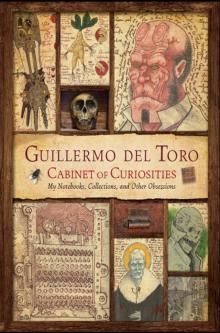 Cabinet of Curiosities
Cabinet of Curiosities The Complete Strain Trilogy
The Complete Strain Trilogy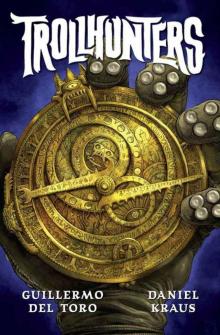 Trollhunters
Trollhunters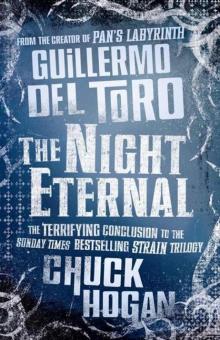 The Night Eternal
The Night Eternal The Fall
The Fall The Shape of Water
The Shape of Water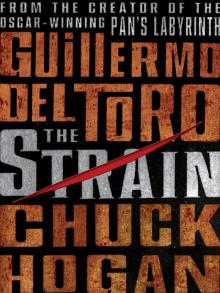 The Strain
The Strain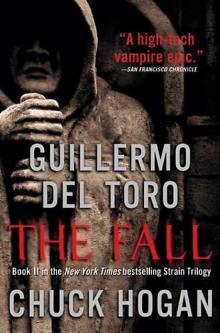 The Fall tst-2
The Fall tst-2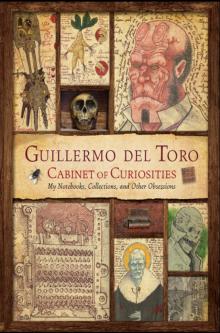 Guillermo del Toro's Cabinet of Curiosities
Guillermo del Toro's Cabinet of Curiosities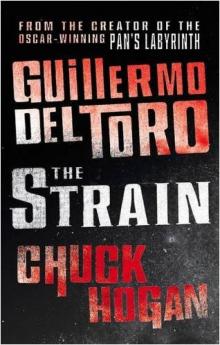 The Strain tst-1
The Strain tst-1 The Strain, the Fall, the Night Eternal
The Strain, the Fall, the Night Eternal